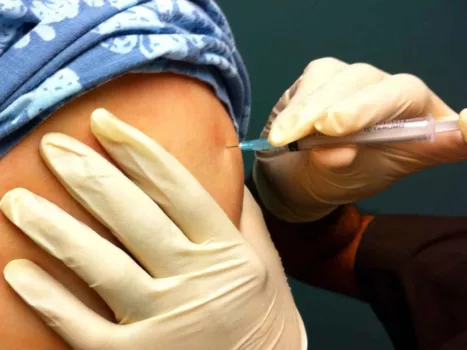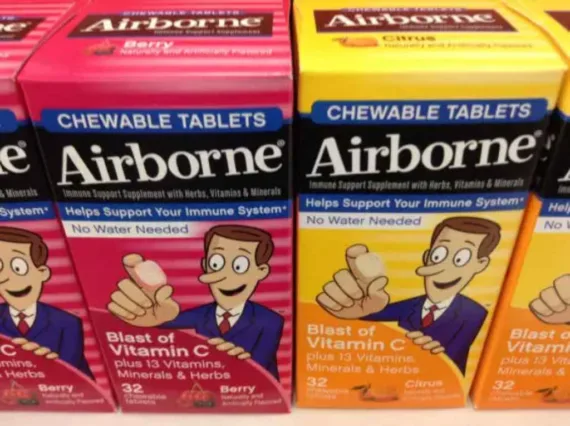
What’s it like getting a tetanus shot?
I can tell you what it’s like — because I just had my first tetanus shot as an adult the other day!
This wasn’t my first tetanus shot ever — it was my fourth. My first three? I got them when I was a child (in the 1980s). So, let’s just say I was a bit overdue for a booster, which adults should get every 10 years.
So why did I suddenly rush off to get a tetanus shot for the first time since ABBA had a Top 40 hit on the radio?
Here’s how an accident during a do-it-yourself project at home brought me to the urgent care center for a tetanus shot… what the process of getting a tetanus vaccine was like for me… and how to know if you need to get a tetanus shot or not…
Why I Needed A Tetanus Shot Recently

I replaced an old metal shed in my yard with a deluxe wood Tuff Shed (which I wrote about here).
The old metal shed came with the 1950s-era house I bought. And while well-built, it had become a rusty, leaky eyesore.
So, after my new wood shed was installed, I moved everything out of the metal shed and soon began demolishing it.
The shed was assembled with panels of sheet metal and screws — but the paneling and screws had more or less become fused together by rust. So I had to carefully pry the old metal shed apart with a garden shovel and crowbar.
Most of the shed came down relatively easily. But a couple panels gave me some trouble — and one of the very last metal panels ended up snapping across my right leg, giving me a very bloody cut.
My first thought: OUCH!!!!
My second thought? I don’t want lockjaw… do I need a tetanus shot?
Questions And Answers About Tetanus Shots

So many questions crossed my mind!
I’m not a medical professional — so I quickly researched answers to my questions, and I learned a whole lot about tetanus shots!
I thought I’d share the answers here, in case anyone else finds themselves in the same situation as me with tons of questions about getting tetanus shots.
What type of wound requires a tetanus shot? Do you need a tetanus shot for a small cut?
You really only need it if you step on a rusty nail, right? I mean, people get cuts all the time and you don’t hear about people dying of tetanus all the time.
Unfortunately, any wound that was caused by something dirty requires a tetanus shot — also known as a tetanus vaccine.
You may be surprised to learn that you even need a tetanus shot for any wound that was caused by a clean objects! Yes… even burns, pinpricks, scrapes from thorns and branches in the garden, animal scratches, and dental visits can introduce tetanus into the body.
Who knew?!
How common is tetanus bacteria?
Clostridium tetani spores can be found anywhere and everywhere. But they’re most common in soil and animal feces.
The spores can remain infectious for more than 40 years in soil. They also exist in environments as diverse as animal excrement, house dust, and the human colon. If the spores enter a wound that penetrates the skin and extends deeper than oxygen can reach, they germinate and produce a toxin that enters the bloodstream. This toxin, tetanospasmin, ranks with botulism toxin as among the most potent known microbial poison.
~WebMD
That means soil treated with manure — such as gardening beds with compost — can be hotspots for the tetanus spores.
That’s right folks, it’s not rust that causes tetanus. It’s the soil that comes in contact with rusty items that lead to tetanus!
The reason we associate tetanus with rust is because it’s often found in soil that’s rich in organic material like manure or dead leaves. Old houses, cars or other discarded items left in nature for long enough will rust (if they’re metal) and collect bacteria like Clostridium tetani — but the relationship between rust and tetanus-causing bacteria is purely correlative, not causative. Humans can be exposed to Clostridium tetani in a variety of non-rusty ways. So if your skin is pierced from anything from your own kitchen knife to a rusty gnarled screw, or if you begin working on a farm, it’s worth making sure that your tetanus shot is up to date.
~McGill
Is a tetanus shot really necessary?
Yes, the general consensus by the vast majority of doctors and clinicians says a tetanus booster shot is required every 10 years.
One small study done by the Oregon Health and Science University suggests it’s possible we may need a tetanus shot only every 30 years. But even if this unverified claim is true, I was still way overdue.
So, if your previous tetanus shot was longer than 10 years ago (or you’ve never had one), then you definitely need a tetanus vaccine for any broken skin wound.
Among all of the vaccine preventable diseases, tetanus is unique in that it is not communicable.
When was the last case of tetanus in the United States?
Wondering how many incidences of lockjaw there are each year — and why we don’t hear more about this? (Me too.)
The answer is because lockjaw is (thankfully!) relatively rare these days. Deaths from tetanus were much more common up until the mid 20th century.
The tetanus vaccine began seeing regular use in the United States during the 1940s. Since then, tetanus has become rare in the United States.
According to the Centers for Disease Control and Prevention, about 30 Americans get tetanus every year — and 2 out of every 10 who get it will die.
Does peroxide kill tetanus?
While it’s important to wash any wound with soap and water, C. tetani spores can survive peroxide.
So don’t trust the old wives tale which claims that peroxide kills everything… including tetanus. It doesn’t!
The one and only thing you can do yourself to help prevent tetanus is to clean the wound well using good ‘ol soap and water. However, if a puncture wound is too deep to clean, then you definitely need a tetanus shot.
What are the signs of tetanus, and how soon do tetanus symptoms appear?
Most symptoms of tetanus rear their ugly head 7 to 10 days after the wound occurs — though it might be as few as 4 days or as long as a few months!
Apparently, the farther the injury is from the central nervous system, the longer the tetanus incubation period may last.
There are many symptoms associated with tetanus, including:
- Fever
- Sweating
- Difficulty swallowing
- Spams in your jaw and neck
- Painful muscle contractions
- Stiffness of your jaw, neck, and other muscles throughout the body
Can your immune system fight off tetanus? Can you have a mild case of tetanus without getting a shot?
Contracting some viruses and diseases just once causes the growth of antibodies that can protect you from getting those maladies again.
That’s not the case with tetanus. While mild or localized tetanus can happen, it often transforms into a general infection — especially with deep wounds that you cannot clean.
And even if your body does naturally overcome one tetanus infection, you can get tetanus again. Therefore, you need a tetanus vaccine to help your body fight tetanus infections.
How soon after cutting yourself do you need a tetanus shot?
This is #1 question that I was particularly nervous about — because I didn’t know if I needed to have the tetanus shot before the injury in order for it to be useful.
It turns out you can, indeed, get the tetanus shot after the wound occurs and have it be useful.
So… what’s the longest time you could wait that it will still be effective?
If you haven’t had a tetanus booster shot in at least 5 years, you should get a tetanus shot within 48 hours of receiving the injury.
Why does a tetanus shot hurt so much?
The shot itself doesn’t hurt.
You can see in this video exactly how painless it is to get a tetanus shot:
However, pain after getting the tetanus vaccine is common — about 2 in 3 adults experience some degree of injection site pain. Over-the-counter pain medication (such as ibuprofen) can help to alleviate the pain.
But why does the injection site hurt?
Soreness in the muscles at the injection site is common with combination vaccines. It can mean that your body is creating antibodies in response to the inactive virus(es) in the vaccine.
How do they test for tetanus to see if you’ve got it?
There is currently no blood test to check for tetanus.
Therefore, medical staff typically begins tetanus treatments at the onset of symptoms.
WebMD lists these as the most common risk factors that increase your likelihood of getting tetanus:
- Failure to get vaccinated or to keep up to date with booster shots against tetanus
- An injury that lets tetanus spores into the wound
- A foreign body, such as a nail or splinter
Tetanus cases have developed from the following:
- Puncture wounds — including from splinters, body piercings, tattoos, and injection drugs
- Gunshot wounds
- Compound fractures
- Burns
- Surgical wounds
- Injection drug use
- Animal or insect bites
- Infected foot ulcers
- Dental infections
- Infected umbilical stumps in newborns born of inadequately vaccinated mothers
Can you survive lockjaw?
I was nervous to see the answer to this one. I mean… what if I couldn’t get a tetanus shot in time?
Since there is no cure for tetanus, the only treatment for lockjaw is wound care and medication to alleviate the symptoms.
Most people who get tetanus survive. But still, an ounce of prevention is worth a pound of cure — because you don’t want to experience the painful symptoms if you don’t have to.
I Decided To Get A Tetanus Shot!
I must confess, I had been putting off getting a tetanus shot for a long time.
I’m relatively healthy with no underlying medical conditions. Why should I get a tetanus shot?
I don’t partake in risky behavior. Yard work and driving to and from Point A and Point B are the riskiest things I normally do.
But getting injured by the shed I was tearing down proved to me that freak accidents can happen. And tetanus can mow down anybody — even the healthiest people.
Types Of Tetanus Vaccines
So, I went to my nearest urgent care center the next morning for a tetanus shot.
I found out there are 4 kinds of tetanus shots:
- DTaP vaccines protect young children from diphtheria, tetanus, and whooping cough
- DT vaccines keep young children from contracting diphtheria and tetanus
- Tdap vaccines protect older children and adults from tetanus, diphtheria, and whooping cough
- Td vaccines fight tetanus and diphtheria in older children and adults
Most children receive 5 rounds of tetanus shots — beginning in infancy and ending around the age of 5, with a tetanus booster shot given at the age of 11 or 12.
As adults, we are expected to continue getting booster shots throughout our adult years.
TIP: Some people make it a point to get their tetanus boosters every 10th birthday, so at age 20, 30, 40, etc.
As for me, getting the adult booster shot was a quick and virtually painless process.
I had only a few mild side effects afterwards, including:
- Knot-like pain at the injection site that lasted a couple days
- Light redness and swelling at the injection site
- Very mild joint pain
Did You Know?
It can be just as effective (and important) for a never-vaccinated adult to get a tetanus shot after an injury as it is for someone who has received the shot and boosters on schedule since childhood.
Are Tetanus Shots Free? Where Can You Get A Tetanus Shot?
If you’re looking for free tetanus shots, check with your city or county clinic. If you have insurance, ask your carrier if you can receive tetanus vaccines for free.
Personally, I have private health insurance and needed to pay a small copay to receive my tetanus shot.
You can get the tetanus vaccine in a variety of places, including:
- Your primary care physician
- Urgent care and walk-in clinics
- Drugstore clinics
- Grocery store pharmacies
- Special pop-up vaccination sites at community health events
The Bottom Line

If you happen to get cut on something that soil has ever touched, and you don’t want to take the chance of getting tetanus… a quick and easy tetanus shot will save you from all the worry.
Oh, and you might want to get a tetanus shot before you participate in an event like a mud run — especially if you already have a cut from a previous injury. Just sayin’.
And as for me? I’ll be keeping up with my tetanus vaccines from now on. It’s better to be safe than sorry!




